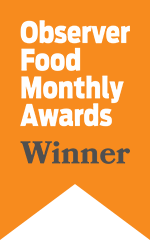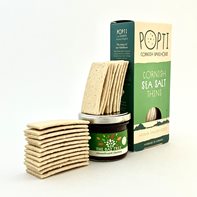

Tor
This pyramid-shaped soft goat's cheese with an ash coating is from Somerset's White Lake Cheese. Matured for 2-3 weeks. Each pyramid weighs around 200g.
Unpasteurised, vegetarian.
White Lake
White Lake Cheese is Roger Longman and Pete Humphries. When I met them, the name ‘Longman’ caught my attention straight away, as there’s a sizeable cheese wholesaler called Longman Cheese Sales based just off the A303 in south Somerset. Sure enough, he’s related to them, so Roger comes from cheese people - his own family made Caerphilly (a well established Somerset cheese, despite what the name would suggest) for 50-60 years, only giving up in 1997.
Pete - dry humour, trace of a Cheshire accent - was the first employee of Bath Soft Cheese, and worked there for 10 years: great experience, but he was keen to get going on his own. For his part, Roger was dying to get back into making, so the two teamed up and in 2004 White Lake Cheese was born. The partnership made a lot of sense: Roger had premises, a herd of milking goats and - as you’re very aware when you meet him - a lot of energy; Pete was the experienced maker - full of ideas.
They started with a quickly-made soft cheese (relatively easy, low-risk), before creating the mould-ripened White Nancy. This was the first White Lake cheese we became
aware of, and it’s a real classic of its type (we use it a lot for wedding cakes). Pete, who has a reputation for naming cheeses after women, insists this is a hill near where he comes from.
Next came Rachel: this started out as a regular hard goat's cheese. One day a particular cheese developed some black moulds which Pete washed off with brine. This set off bacterial action which affected the character of the cheese in a way that he liked. Today’s Rachel always uses this ‘washed rind’ process and has become their biggest seller. It’s a star item, and as Pete points out, no one else in the country makes a washed rind goat's cheese. It’s probably a niche cheese, but they’ve clearly made it work.
They’re still experimenting (I strongly suspect they can’t stop) and this restless exploration is one of their hallmarks. When I visited Pete had done a market to which he’d taken 21 different types of cheese. We stock a number of White Lake cheeses, including (but not limited to!) Driftwood, Morn Dew and Sheep Rustler.













